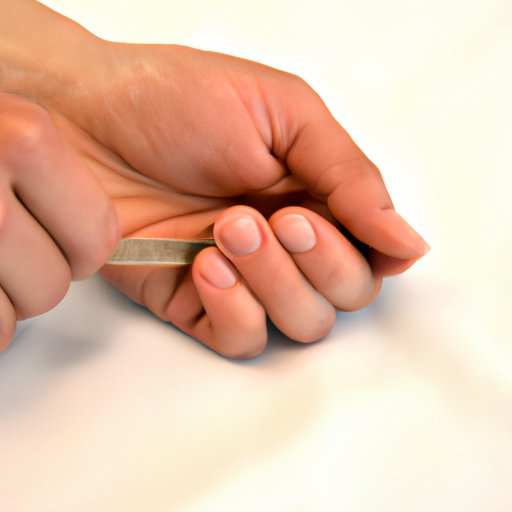
I. Introduction
Warts are a common problem that can be both unsightly and uncomfortable. These small, rough growths can appear anywhere on the body and are caused by a viral infection. Fortunately, there are many different treatments available for removing warts and preventing them from coming back. This article will explore six different topics related to wart removal and prevention, from natural remedies to professional medical treatment.
II. Natural Remedies for Wart Removal
Many people prefer to use natural remedies to remove their warts, as they are often safer and more affordable than medical treatments. Some popular natural remedies include:
- Tea tree oil: Apply a few drops of tea tree oil to the wart twice a day.
- Garlic: Crush a garlic clove and apply the juice to the wart.
- Duct tape: Cover the wart with duct tape for six days, then remove the tape, soak the wart, and use a pumice stone to gently remove dead skin.
It’s important to note that natural remedies may not be as effective as medical treatments for removing warts. Additionally, some natural remedies can cause skin irritation or allergic reactions, so be sure to follow instructions carefully and stop using a treatment if you experience discomfort.
III. Wart Removal at Home: Do’s and Don’ts
If you choose to remove your wart at home, it’s important to take certain precautions to avoid infection and ensure that the wart is fully removed.
- Do clean the affected area thoroughly with soap and water before and after treatment.
- Do sterilize any tools you use, such as a razor or nail clipper, before and after use.
- Do follow the instructions carefully for any treatment you choose to use.
- Don’t pick or scratch at the wart, as this can cause it to spread.
- Don’t use a treatment for longer than recommended or try to remove the wart by cutting it off, as this can cause scarring or infection.
- If your wart does not go away or if you experience pain, bleeding, or signs of infection, seek professional medical help.
IV. The Pros and Cons of Over-the-Counter Wart Removers
There are many different over-the-counter (OTC) products available for removing warts, including salicylic acid and freeze-off kits. While these products can be effective, they also come with certain risks and drawbacks.
- Salicylic acid: This treatment works by dissolving the layers of the wart over time. It may take several weeks of regular use to completely remove the wart, and it may also cause skin irritation or damage surrounding skin.
- Freeze-off kits: These kits use liquid nitrogen to freeze the wart, causing it to fall off. This treatment can be painful and may cause scarring or discoloration.
If you choose to use an OTC wart remover, be sure to follow the instructions carefully and stop use if you experience discomfort. It’s also a good idea to speak with a healthcare professional before using an OTC product, particularly if you have diabetes or other medical conditions that can affect your skin.
V. Removing Warts: A Doctor’s Guide
If natural remedies or OTC products are not effective for removing your wart, or if you have a particularly large or painful wart, it may be necessary to seek professional medical treatment. Some common medical treatments for warts include:
- Cryotherapy: This treatment involves freezing the wart with liquid nitrogen, causing it to fall off.
- Laser therapy: This treatment uses a laser to remove the wart, often with less scarring or discomfort than other methods.
- Surgery: In some cases, a healthcare professional may choose to surgically remove the wart.
It’s important to speak with a healthcare professional before undergoing any medical treatment for warts. Not all treatments are right for every patient, and a healthcare professional can help you select the best option for your needs.
VI. Preventing Warts: What You Need to Know
One of the best ways to deal with warts is to prevent them from forming in the first place. Some strategies for preventing warts include:
- Washing your hands regularly to avoid picking up or spreading the virus that causes warts.
- Avoiding sharing personal items like towels, razors, and shoes.
- Keeping your skin healthy and strong with good hygiene practices and a balanced diet.
- Boosting your immune system with regular exercise and sufficient sleep.
If you do come into contact with the virus that causes warts, it’s important to keep an eye out for any unusual growths or discomfort. Early detection and treatment can help prevent warts from spreading or becoming more difficult to remove.
VII. Living with Warts: Coping Strategies and Support
Coping with warts can be challenging, particularly if they are located in a visible or sensitive area. Some strategies for coping with warts include:
- Talking to a healthcare professional or mental health provider about any emotional or psychological distress caused by the warts.
- Practicing stress management techniques like meditation, exercise, or deep breathing.
- Focusing on self-care activities like getting a massage or taking a relaxing bath.
- Joining a support group or seeking out online resources to connect with other people who are dealing with warts.
VIII. Conclusion
In conclusion, warts are a common problem that can be both uncomfortable and unsightly. However, there are many different treatments available for removing warts and preventing them from coming back. From natural remedies to professional medical treatment, this article has explored six different topics related to wart removal and prevention. If you are struggling with warts, remember that there is help available and that it’s important to seek professional medical advice if your warts are causing you pain or discomfort.





